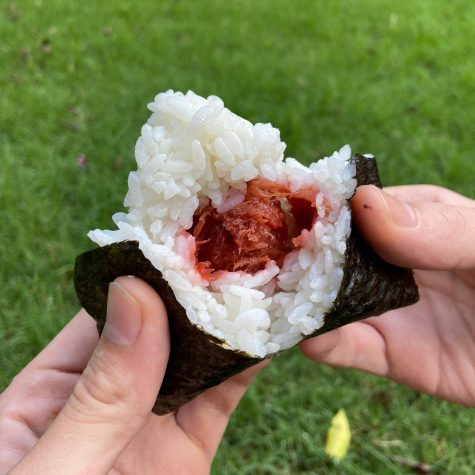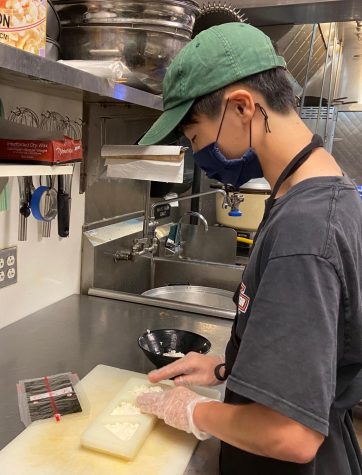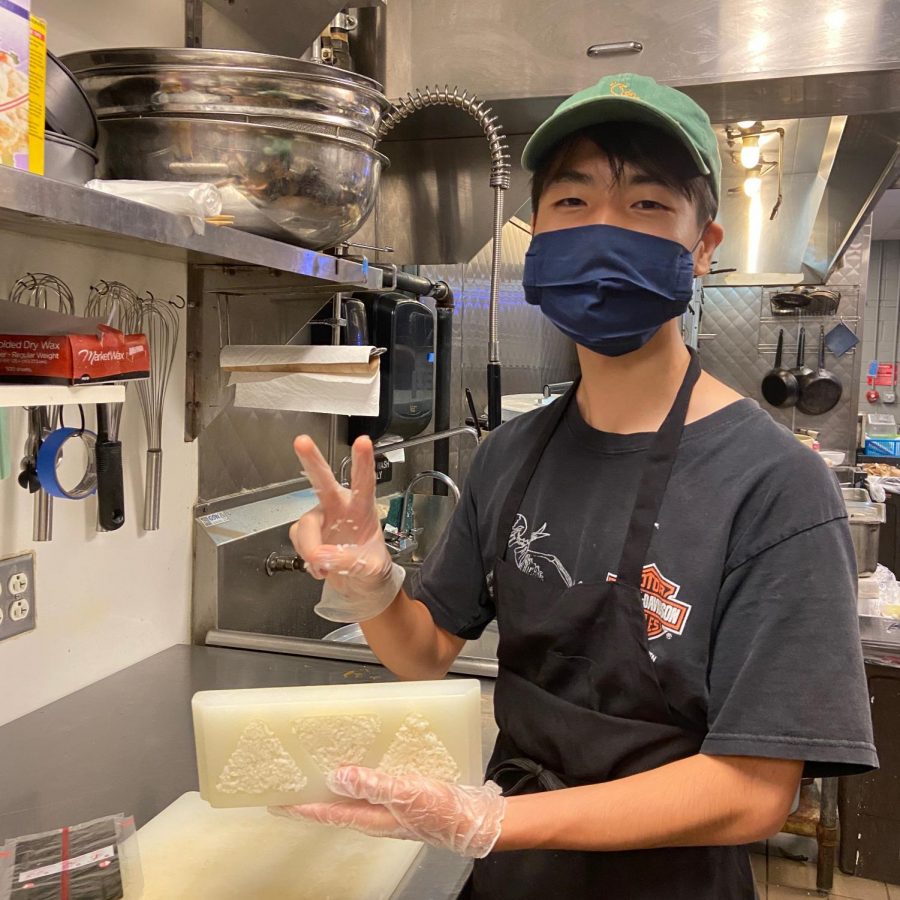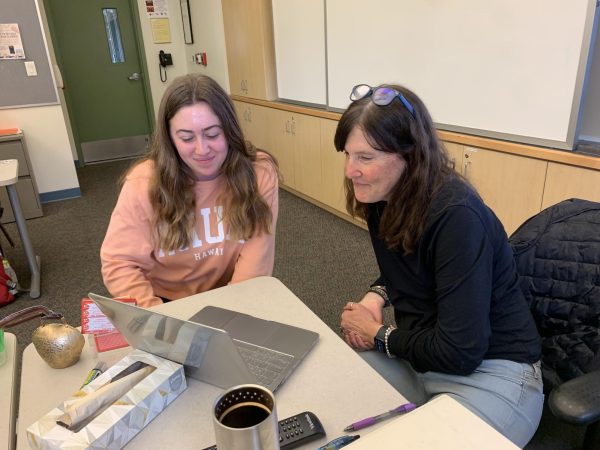Asazu launches an appetizing business
Enterprising Mac junior has built a loyal customer base with his homemade onigiri (Japanese rice balls)
Photo courtesy of Kenta Asazu
It took Kenta Asazu more than three months just to get the permits to sell onigiri. After peaking at 100 orders per week, Asazu now has a stable base of 50 orders per week. He plans to continue his business during the school year. Photo courtesy of Asazu.
September 17, 2020
It’s Saturday morning and junior Kenta Asazu is hard at work.
While many high school students his age would be sleeping in, especially on a summer Saturday during the pandemic, Asazu would not think of complaining to his boss about the early hours.
That’s because he is his own boss.
On Saturday mornings, Asazu wakes up and starts making his orders from the previous week and delivering them on his bike. Out of boredom and the want for money, Asazu decided to start his own business.
“I make Japanese rice balls called onigiri,” Asazu said. “It’s salted rice with filling inside that is usually eaten as a snack. My parents own a restaurant and they also sell onigiri. To be honest, it’s not as good as it could be. I was just thinking, ‘Oh I could do that better and probably make some money so why not,’ That’s how it happened.”
Asazu’s company is named Samurice, and was named by his friend’s mom, who thought the combination of the words samurai and rice sounded cute.
After he originally came up with the idea for Samurice, it took Asazu longer than expected to finally get business going. At first, Asazu didn’t want to pay taxes, but to obtain a permit to operate a food enterprise, he needed a DBA, which allows him to operate under a trade name, and to pay a fee to obtain the permit.
“It took me three and a half months to get everything because I’m a minor,” Asazu said. “Some things I have to do under my mom’s name, but others I can do under my name. For taxes, I put that under my mom’s name but I still have to pay for it.”
Once Asazu got all of the permits and forms he needed to begin sales and delivery, he started taking orders.
“I take orders through Instagram, Facebook, text, and email,” Asazu said. “I’ll accept orders basically any way that you can communicate with me.”

When Asazu first started Samurice, he would receive almost 80-100 orders every week, but now he receives around 50 regularly. On Saturdays, he makes, packages, and delivers his orders.
“I make all of the orders at once, and then I start packaging them,” Asazu said. “By packaging, I use seaweed, and I just wrap the seaweed around it. It probably takes me about an hour or a little less to make 30 orders. On my website, it has a map with an orange outline for where I can bike, but most of the orders are for pickup at a coffee shop.”
Asazu said that he probably spends around seven hours total every week making and delivering orders. For delivery, Asazu bikes, so he only delivers to a small area. For orders that are outside of his biking range, he offers pickup at the Sa-Tén coffee house on Airport Boulevard from 10 a.m. to 4 p.m.

While at first Asazu was only in the business game for a little extra pocket change, he soon realized that his food was having a positive impact on one particular family that had become a regular customer of his.
“I had this customer who would buy it for five weeks straight, which was crazy,” Asazu said. “She would send me pictures of her kids eating it and eating it for their birthday, so that was really nice. It starts to feel like there is a lot more going into it, and it makes you think a lot more.”
For now, Asazu just wants to be able to balance his school workload with his business work so that he isn’t too overwhelmed.
“I want to keep my business the way it is, and especially with junior year, I just want to keep it simple,” Asazu said. “During the school year, I’m probably going to have a couple of electives where I won’t have very much work, so I’ll rely on those. The good thing is that everything is on my computer, and in my email, so I don’t have to move around too much. I can still be in class and be working, which is nice.”
While Asazu does not have any plans to open a restaurant after high school or college, he isn’t completely ruling out the idea.
“I don’t have any sort of plan at the moment, but never say never.”
This story was originally published on The Shield Online on September 6, 2020.





























![IN THE SPOTLIGHT: Junior Zalie Mann performs “I Love to Cry at Weddings,” an ensemble piece from the fall musical Sweet Charity, to prospective students during the Fine Arts Showcase on Wednesday, Nov. 8. The showcase is a compilation of performances and demonstrations from each fine arts strand offered at McCallum. This show is put on so that prospective students can see if they are interested in joining an academy or major.
Sweet Charity originally ran the weekends of Sept. 28 and Oct. 8, but made a comeback for the Fine Arts Showcase.
“[Being at the front in the spotlight] is my favorite part of the whole dance, so I was super happy to be on stage performing and smiling at the audience,” Mann said.
Mann performed in both the musical theatre performance and dance excerpt “Ethereal,” a contemporary piece choreographed by the new dance director Terrance Carson, in the showcase. With also being a dance ambassador, Mann got to talk about what MAC dance is, her experience and answer any questions the aspiring arts majors and their parents may have.
Caption by Maya Tackett.](https://bestofsno.com/wp-content/uploads/2024/02/53321803427_47cd17fe70_o-1-1200x800.jpg)
![SPREADING THE JOY: Sophomore Chim Becker poses with sophomores Cozbi Sims and Lou Davidson while manning a table at the Hispanic Heritage treat day during lunch of Sept 28. Becker is a part of the students of color alliance, who put together the activity to raise money for their club.
“It [the stand] was really fun because McCallum has a lot of latino kids,” Becker said. “And I think it was nice that I could share the stuff that I usually just have at home with people who have never tried it before.”
Becker recognizes the importance of celebrating Hispanic heritage at Mac.
“I think its important to celebrate,” Becker said. “Because our culture is awesome and super cool, and everybody should be able to learn about other cultures of the world.”
Caption by JoJo Barnard.](https://bestofsno.com/wp-content/uploads/2024/01/53221601352_4127a81c41_o-1200x675.jpg)















